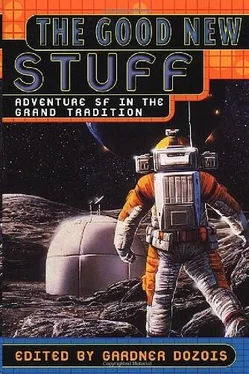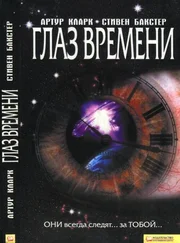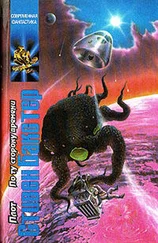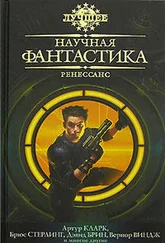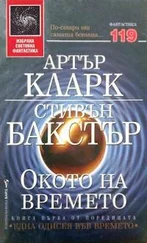Стивен Бакстер - The Good New Stuff
Здесь есть возможность читать онлайн «Стивен Бакстер - The Good New Stuff» весь текст электронной книги совершенно бесплатно (целиком полную версию без сокращений). В некоторых случаях можно слушать аудио, скачать через торрент в формате fb2 и присутствует краткое содержание. Год выпуска: 2002, ISBN: 2002, Издательство: St. Martin's Griffin, Жанр: Фантастика и фэнтези, на английском языке. Описание произведения, (предисловие) а так же отзывы посетителей доступны на портале библиотеки ЛибКат.
- Название:The Good New Stuff
- Автор:
- Издательство:St. Martin's Griffin
- Жанр:
- Год:2002
- ISBN:0-312-26456-9
- Рейтинг книги:3 / 5. Голосов: 1
-
Избранное:Добавить в избранное
- Отзывы:
-
Ваша оценка:
- 60
- 1
- 2
- 3
- 4
- 5
The Good New Stuff: краткое содержание, описание и аннотация
Предлагаем к чтению аннотацию, описание, краткое содержание или предисловие (зависит от того, что написал сам автор книги «The Good New Stuff»). Если вы не нашли необходимую информацию о книге — напишите в комментариях, мы постараемся отыскать её.
The Good New Stuff — читать онлайн бесплатно полную книгу (весь текст) целиком
Ниже представлен текст книги, разбитый по страницам. Система сохранения места последней прочитанной страницы, позволяет с удобством читать онлайн бесплатно книгу «The Good New Stuff», без необходимости каждый раз заново искать на чём Вы остановились. Поставьте закладку, и сможете в любой момент перейти на страницу, на которой закончили чтение.
Интервал:
Закладка:
"Given its density, Lady Mac can carry roughly 5,000 tons of gold in her cargo holds," Marcus said. "That'll make maneuvering very sluggish, but I can handle her."
Roman grinned at Karl. "And today's price for gold is three and a half thousand fuseodollars per kilogram."
Karl's eyes went blank for a second as his neural nanonics ran the conversion. "Seventeen billion fuseodollars worth!"
He laughed. "Per trip."
"How is this Ribeiro character proposing to divide the proceeds?" Schutz asked.
"We get one third," Marcus said. "Roughly five point eight billion fuseodollars. Of which I take 30 per cent. The rest is split equally between you, as per the bounty flight clause in your contracts."
"Shit," Karl whispered. "When do we leave, Captain?"
"Does anybody have any objections?" Marcus asked. He gave Wai a quizzical look.
"Okay," she said. "But just because you can't see surface cracks, it doesn't mean there isn't any metal fatigue."
The docking cradle lifted Lady Macbeth cleanly out of the spaceport's crater-shaped bay. As soon as she cleared the rim her thermo-dump panels unfolded, sensor clusters rose up out of their recesses on long booms. Visual and radar information was collated by the flight computer, which datavised it directly into Marcus's neural nanonics. He lay on the acceleration couch at the center of the bridge with his eyes closed as the external starfield blossomed in his mind. Delicate icons unfurled across the visualization, ship status schematics and navigational plots sketched in primary colors.
Chemical verniers fired, lifting Lady Mac off the cradle amid spumes of hot saffron vapor. A tube of orange circles appeared ahead of him, the course vector formatted to take them in towards the gas giant. Marcus switched to the more powerful ion thrusters, and the orange circles began to stream past the hull.
The gas giant, Zacateca, and its moon, Lazaro, had the same apparent size as Lady Mac accelerated away from the spaceport. Sonora was one of fifteen asteroids captured by their Lagrange point, a zone where their respective gravity fields were in equilibrium. Behind the starship, Lazaro was a grubby gray crescent splattered with white craters. Given that Zacateca was small for a gas giant, barely 40,000 kilometers in diameter, Lazaro was an unusual companion. A moon 9,000 kilometers in diameter, with an outer crust of ice 50 kilometers deep. It was that ice which had originally attracted the interest of the banks and multistellar finance consortia. Stony iron asteroids were an ideal source of metal and minerals for industrial stations, but they were also notoriously short of the light elements essential to sustain life. To have abundant supplies of both so close together was a strong investment incentive.
Lady Mac 's radar showed Marcus a serpentine line of one-ton ice cubes flung out from Lazaro's equatorial mass-driver, gliding inertly up to the Lagrange point for collection. The same inexhaustible source which allowed Sonora to have its unique sea.
All the asteroids in the cluster had benefited from the plentiful ice, their economic growth racing ahead of equivalent settlements. Such success always bred resentment among the indigenous population, who inevitably became eager for freedom from the founding companies. In this case, having so many settlements so close together gave their population a strong sense of identity and shared anger. The cluster's demands for autonomy had become increasingly strident over the last few years. A situation agitated by numerous violent incidents and acts of sabotage against the company administration staff.
Ahead of the Lady Mac, Marcus could see the tidal hurricane Lazaro stirred up amid the wan amber and emerald stormbands of Zacateca's upper atmosphere. An ocean-sized hypervelocity maelstrom which followed the moon's orbit faithfully around the equator. Lightning crackled around its fringes, 500-kilometer-long forks stabbing out into the surrounding cyclones of ammonia cirrus and methane sleet.
The starship was accelerating at two gees now, her triple fusion drives sending out a vast streamer of arc-bright plasma as she curved around the bulk of the huge planet. Her course vector was slowly bending to align on the star which Antonio intended to prospect, 38 light-years distant. There was very little information contained in the almanac file other than confirming it was a K-class star with a disc.
Marcus cut the fusion drives when the Lady Mac was 7,000 kilometers past perigee and climbing steadily. The thermo-dump panels and sensor clusters sank down into their jump recesses below the fuselage, returning the ship to a perfect sphere. Fusion generators began charging the energy-patterning nodes. Orange circles flashing through Marcus's mind were illustrating the slingshot parabola she'd flown, straightening up the farther the gas giant was left behind. A faint star slid into the last circle.
An event horizon swallowed the starship. Five milliseconds later it had shrunk to nothing.
"Okay, try this one," Katherine said. "Why should the gold or anything else congeal into lumps as big as the ones they say it will? Just because you've got a planetoid with a hot core doesn't mean it's producing the metallic equivalent of fractional distillation. You're not going to get an onion-layer effect with strata of different metals. It doesn't happen on planets, it won't happen here. If there is gold, and platinum and all the rest of this fantasy junk, it's going to be hidden away in ores just like it always is."
"So Antonio exaggerated when he said it would be pure," Karl retorted. "We just hunt down the highest-grade ore particles in the disc. Even if it's only 50 per cent, who cares? We're never going to be able to spend it all anyway."
Marcus let the discussion grumble on. It had been virtually the only topic for the crew since they'd departed Sonora five days ago. Katherine was playing the part of chief skeptic, with occasional support from Schutz and Wai; while the others tried to shoot her down. The trouble was, he acknowledged, that none of them knew enough to comment with real authority. At least they weren't talking about the sudden departure from Ayachcho any more.
"If the planetoids did produce ore, then it would fragment badly during the collision which formed the disc," Katherine said. "There won't even be any mountain-sized chunks left, only pebbles."
"Have you taken a look outside recently?" Roman asked. "The disc doesn't exactly have a shortage of large particles."
Marcus smiled to himself at that. The disc material had worried him when they arrived at the star two days ago.
Lady Mac had jumped deep into the system, emerging three million kilometers above the ecliptic. It was a superb vantage point. The small orange star burned at the center of a disc 160 million kilometers in diameter. There were no distinct bands like those found in a gas giant's rings; this was a continuous grainy copper mist veiling half of the universe. Only around the star itself did it fade away; whatever particles were there to start with had long since evaporated to leave a clear band three million kilometers wide above the turbulent photosphere.
Lady Mac was accelerating away from the star at a twentieth of a gee, and curving around into a retrograde orbit. It was the vector which would give the magnetic arrays the best possible coverage of the disc. Unfortunately, it increased the probability of collision by an order of magnitude. So far, the radar had only detected standard motes of interplanetary dust, but Marcus insisted there were always two crew on duty monitoring the local environment.
"Time for another launch," he announced.
Читать дальшеИнтервал:
Закладка:
Похожие книги на «The Good New Stuff»
Представляем Вашему вниманию похожие книги на «The Good New Stuff» списком для выбора. Мы отобрали схожую по названию и смыслу литературу в надежде предоставить читателям больше вариантов отыскать новые, интересные, ещё непрочитанные произведения.
Обсуждение, отзывы о книге «The Good New Stuff» и просто собственные мнения читателей. Оставьте ваши комментарии, напишите, что Вы думаете о произведении, его смысле или главных героях. Укажите что конкретно понравилось, а что нет, и почему Вы так считаете.
